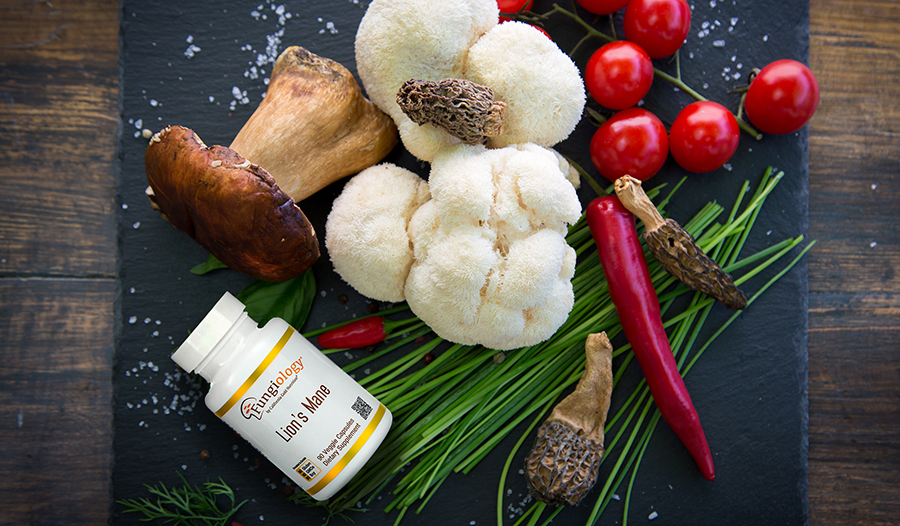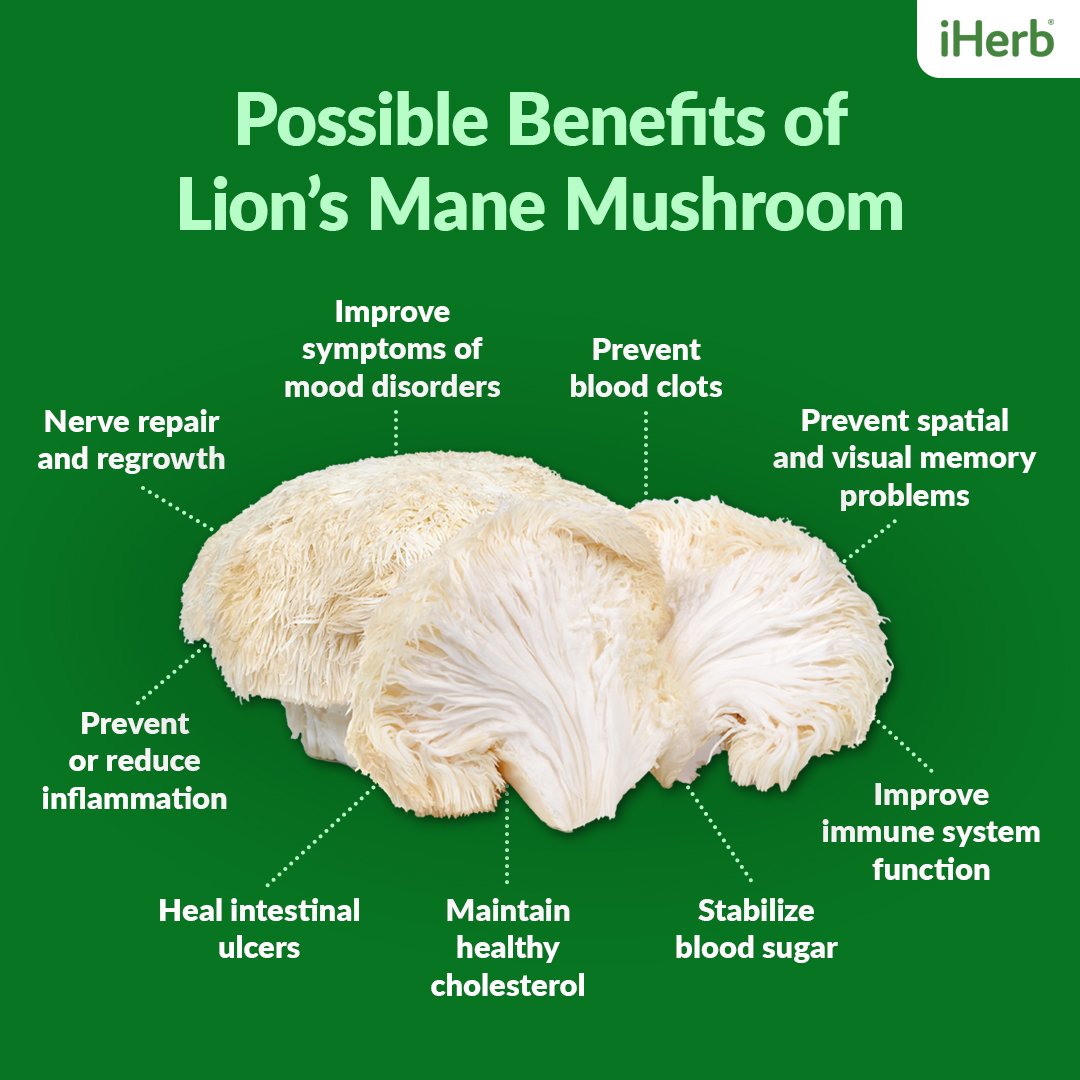Lion’s Mane: Here Are 11 Researched Benefits

Lion’s Mane: Here Are 11 Researched Benefits of "the Brain Mushroom”
What is Lion’s Mane?
Lion’s mane mushroom is a very distinct fungus in appearance and medicinal uses. It is a creamy white color and is not shaped like the most common mushrooms with stems and caps. Depending on the variety, it appears more like coral or having hedgehog-like spikes in a single stemless mass, and grows naturally in many places around the globe. With its significantly increased popularity, it is being cultivated on a small scale for both culinary and medicinal uses.
Its scientific Latin name, Hericium, means hedgehog for its spiky appearance. It is also known as coral mushroom, hou tou gu, and yamabushitake in different parts of the world.
Lion’s mane is used medicinally as a tea, tincture, powdered, or encapsulated. It can be eaten fresh and is delicious sautéed in butter or ghee. Never pick any mushrooms in the wild without expert identification. You may be able to find it cultivated or wildcrafted at your local farmer’s market to eat fresh.
What Are the Health Benefits of Lion’s Mane Mushrooms?

Modern research on lion’s mane is expanding. The most well-known uses for lion’s mane are for cognitive performance or neurological health. There may also be preliminary evidence for improving digestive issues, antifungal activity, immune system health, blood sugar stabilization, anti-inflammatory properties, respiratory disease, supporting healthy cholesterol and blood pressure, encouraging healthy wound healing, and preventing various chronic diseases.
Some of the components of lion’s mane also suggest that it may help support a positive mood. Most of the current research has been done on rats, but new human studies are coming out.
Traditional indigenous uses for lion’s mane include addressing digestive issues like ulcers, support for general debility and athletic performance, and a styptic for wounds.
Lion’s mane is generally safe, with no major reported adverse effects. However, if you are allergic to mushrooms, ask a licensed healthcare provider about trying lion’s mane.
1. Nerve Repair and Growth
A rat study found that a nerve crush injury treated with a water extract of lion’s mane was helpful in nerve regrowth and repair. A Malaysian study found that lion’s mane is helpful for nerve growth and differentiation in humans. Other studies have found the mushroom beneficial in diabetic neuropathy. Thus, lion’s mane may help treat peripheral nerve disorders and injuries, as well as promote new growth and the health of neurons.
2. Alzheimer’s Disease
A study of in vitro rat cells found that lion’s mane extract helped reduce damage to neurons caused by the amyloid-beta protein, a major cause of Alzheimer’s disease. This indicated that lion’s mane extract may have antioxidant and neuroprotective effects in rats. More research is needed in humans, but this is a promising first step in potentially using lion’s mane to treat neurological diseases.
3. Mood and Sleep Disorders
A 2019 review of research and scientific information suggested that there may be preliminary, indirect evidence that lion’s mane can be helpful in treating mood disorders. The potential mechanisms for this include lion’s mane’s affinity for improving overall neurological health as well as being an anti-inflammatory to the nervous system. This study recommended further research into the promising early information on lion’s mane’s benefits for mood disorders. Lion’s mane may be a helpful addition to a comprehensive mental healthcare plan.
In a study of people with larger body sizes, participants who were also suffering from mood disorders, sleep disorders, or binge eating issues were given lion’s mane for 8 weeks. The results found that lion’s mane may be helpful in depressive-anxious mood disorders and improve the quality of sleep.
A small placebo-controlled study of 30 menopausal women found that consuming lion’s mane for 4 weeks noticeably reduced the symptoms of depression and anxiety.
4. Seizure Disorders
Research has found that lion’s mane, specifically the Hericium Erinaceus variety, may help prevent damage to nerves after seizures in mice. More study is needed to confirm these results and apply them to humans. Talk to your doctor about adding lion’s mane to any established treatment for seizure disorders.
5. Stroke Recovery and Prevention
A Taiwanese study performed on mice who had suffered ischemic strokes found that lion’s mane can help prevent damage to the brain due to oxygen deprivation. This further encourages other studies that show promise for nerve growth. Talk to your doctor about your stroke recovery and prevention program.
A study found that a component of lion’s mane may help prevent blood clots, which can lead to heart attack and stroke in vitro using both rabbit and human cells. More studies would need to confirm this in humans, and always discuss any treatments for serious risks such as blood clots with your doctor.
6. Cognitive Function
Studies in mice have found that consuming lion’s mane may help prevent spatial and visual memory problems.
A small, double-blind, placebo-controlled study in Japanese adults found significant improvement in cognitive functioning over the course of the 16-week study. Improvement in mild cognitive impairment increased further at each interval of 8, 12, and 16 weeks of the study. However, after discontinuing ingestion of lion’s mane, the beneficial effects wore off. More study is needed to examine a sustainable long-term approach to improved cognitive function.
7. Stomach and Intestinal Health
Traditional indigenous use for lion’s mane includes healing intestinal ulcers. A 2015 study confirmed the efficacy of this traditional use in mice. Lion’s mane was found to decrease the ulcerated area of mice's stomachs and prevent further ulceration. Other studies on various digestive disorders in humans have found conflicting results, some positive and some negative. Proper dosing is important to receive benefits, so consult your qualified healthcare provider to try this as part of a comprehensive stomach and intestinal health plan.
8. Inflammation
The underlying cause or exacerbation of many chronic diseases is inflammation. One of the health benefits of lion's mane is showing some exciting preliminary promise as a general anti-inflammatory. One 2015 study specifically looked into the inflammation of adipose, or fat tissue, and lion’s mane administration and found that lion’s mane may prevent or reduce inflammation associated with obesity.
9. Diabetes
Another study in diabetic rats found that lion’s mane can help stabilize blood sugar, lower cholesterol, and control inflammation, as well as improve other measures of chronic disease. Lion’s mane may be included as part of a comprehensive plan on managing symptoms and parameters of diabetes.
10. Maintaining Healthy Cholesterol
In an in vitro study, it has been found that lion’s mane can help prevent the oxidation of LDL cholesterol, which is widely believed to be one of the main causes of clogged arteries. However, we need more research to see if this is reproducible in animals or humans.
One study in rats found that administering lion’s mane improved lipid metabolism and decreased body weight over the course of 28 days.
Another study involving obese rats fed a high-fat diet found that cholesterol, including LDL, HDL, and triglycerides, returned to normal after administering lion’s mane. This is promising, but more research is needed in humans to verify that this is an appropriate treatment for lipid metabolism, weight loss, heart disease, and high cholesterol.
11. Immune System
Some research has indicated that lion’s mane improves the immune system by stimulating the gut microbiota to activate intestinal immunity. Other research indicates it directly stimulates immunity-specific white blood cells. We are still learning how lion’s mane helps our immune system function, but it may be a helpful addition to the most important parts of healthy immunity including good sleep, a healthy diet, good stress management, and exercise.
Takeaway
Lion’s mane is gaining a lot of traction for many disorders related to the nervous system and cognitive function. It may also provide some other benefits common to other mushrooms, like immune support, anti-inflammatory properties, and general health support. In addition, research is steadily mounting on the benefits for many other body systems.
Talk to your doctor or a licensed naturopathic doctor about a well-rounded, individualized plan for your mental, neurological, and overall health that may include lion’s mane.
References:
- Cheng JH, Tsai CL, Lien YY, Lee MS, Sheu SC. High molecular weight of polysaccharides from Hericium erinaceus against amyloid beta-induced neurotoxicity. BMC Complement Altern Med. 2016;16:170. Published 2016 Jun 7. doi:10.1186/s12906-016-1154-5
- Choi WS, Kim YS, Park BS, Kim JE, Lee SE. Hypolipidaemic Effect of Hericium erinaceum Grown in Artemisia capillaris on Obese Rats. Mycobiology. 2013;41(2):94-99. doi:10.5941/MYCO.2013.41.2.94
- Chong PS, Fung ML, Wong KH, Lim LW. Therapeutic Potential of Hericium erinaceus for Depressive Disorder. Int J Mol Sci. 2019;21(1):163. Published 2019 Dec 25. doi:10.3390/ijms21010163
- Diling C, Chaoqun Z, Jian Y, et al. Immunomodulatory Activities of a Fungal Protein Extracted from Hericium erinaceus through Regulating the Gut Microbiota. Front Immunol. 2017;8:666. Published 2017 Jun 12. doi:10.3389/fimmu.2017.00666
- Hiwatashi K, Kosaka Y, Suzuki N, et al. Yamabushitake mushroom (Hericium erinaceus) improved lipid metabolism in mice fed a high-fat diet. Biosci Biotechnol Biochem. 2010;74(7):1447-1451. doi:10.1271/bbb.100130
- Jang HJ, Kim JE, Jeong KH, Lim SC, Kim SY, Cho KO. The Neuroprotective Effect of Hericium erinaceus Extracts in Mouse Hippocampus after Pilocarpine-Induced Status Epilepticus. Int J Mol Sci. 2019;20(4):859. Published 2019 Feb 16. doi:10.3390/ijms20040859
- Lai PL, Naidu M, Sabaratnam V, et al. Neurotrophic properties of the Lion's mane medicinal mushroom, Hericium erinaceus (Higher Basidiomycetes) from Malaysia. Int J Med Mushrooms. 2013;15(6):539-554. doi:10.1615/intjmedmushr.v15.i6.30
- Lee KF, Chen JH, Teng CC, et al. Protective effects of Hericium erinaceus mycelium and its isolated erinacine A against ischemia-injury-induced neuronal cell death via the inhibition of iNOS/p38 MAPK and nitrotyrosine. Int J Mol Sci. 2014;15(9):15073-15089. Published 2014 Aug 27. doi:10.3390/ijms150915073
- Liang B, Guo Z, Xie F, Zhao A. Antihyperglycemic and antihyperlipidemic activities of aqueous extract of Hericium erinaceus in experimental diabetic rats. BMC Complement Altern Med. 2013;13:253. Published 2013 Oct 3. doi:10.1186/1472-6882-13-253
- Mori K, Inatomi S, Ouchi K, Azumi Y, Tuchida T. Improving effects of the mushroom Yamabushitake (Hericium erinaceus) on mild cognitive impairment: a double-blind placebo-controlled clinical trial. Phytother Res. 2009;23(3):367-372. doi:10.1002/ptr.2634
- Mori K, Kikuchi H, Obara Y, et al. Inhibitory effect of hericenone B from Hericium erinaceus on collagen-induced platelet aggregation. Phytomedicine. 2010;17(14):1082-1085. doi:10.1016/j.phymed.2010.05.004
- Mori K, Obara Y, Moriya T, Inatomi S, Nakahata N. Effects of Hericium erinaceus on amyloid β(25-35) peptide-induced learning and memory deficits in mice. Biomed Res. 2011;32(1):67-72. doi:10.2220/biomedres.32.67
- Mori K, Ouchi K, Hirasawa N. The Anti-Inflammatory Effects of Lion's Mane Culinary-Medicinal Mushroom, Hericium erinaceus (Higher Basidiomycetes) in a Coculture System of 3T3-L1 Adipocytes and RAW264 Macrophages. Int J Med Mushrooms. 2015;17(7):609-618. doi:10.1615/intjmedmushrooms.v17.i7.10
- Nagano M, Shimizu K, Kondo R, et al. Reduction of depression and anxiety by 4 weeks Hericium erinaceus intake. Biomed Res. 2010;31(4):231-237. doi:10.2220/biomedres.31.231
- Rahman MA, Abdullah N, Aminudin N. Inhibitory effect on in vitro LDL oxidation and HMG Co-A reductase activity of the liquid-liquid partitioned fractions of Hericium erinaceus (Bull.) Persoon (lion's mane mushroom). Biomed Res Int. 2014;2014:828149. doi:10.1155/2014/828149
- Rogers R. The Fungal Pharmacy: The Complete Guide to Medicinal Mushrooms and Lichens of North America. North Atlantic Books; 2011.
- Sheng X, Yan J, Meng Y, et al. Immunomodulatory effects of Hericium erinaceus derived polysaccharides are mediated by intestinal immunology. Food Funct. 2017;8(3):1020-1027. doi:10.1039/c7fo00071e
- Vigna L, Morelli F, Agnelli GM, et al. Hericium erinaceus Improves Mood and Sleep Disorders in Patients Affected by Overweight or Obesity: Could Circulating Pro-BDNF and BDNF Be Potential Biomarkers?. Evid Based Complement Alternat Med. 2019;2019:7861297. Published 2019 Apr 18. doi:10.1155/2019/7861297
- Wang M, Konishi T, Gao Y, Xu D, Gao Q. Anti-Gastric Ulcer Activity of Polysaccharide Fraction Isolated from Mycelium Culture of Lion's Mane Medicinal Mushroom, Hericium erinaceus (Higher Basidiomycetes). Int J Med Mushrooms. 2015;17(11):1055-1060. doi:10.1615/intjmedmushrooms.v17.i11.50
- Wong KH, Naidu M, David RP, Bakar R, Sabaratnam V. Neuroregenerative potential of lion's mane mushroom, Hericium erinaceus (Bull.: Fr.) Pers. (higher Basidiomycetes), in the treatment of peripheral nerve injury (review). Int J Med Mushrooms. 2012;14(5):427-446. doi:10.1615/intjmedmushr.v14.i5.10
- Yi Z, Shao-Long Y, Ai-Hong W, et al. Protective Effect of Ethanol Extracts of Hericium erinaceus on Alloxan-Induced Diabetic Neuropathic Pain in Rats. Evid Based Complement Alternat Med. 2015;2015:595480. doi:10.1155/2015/595480
DISCLAIMER:This Wellness Hub does not intend to provide diagnosis...
















































































 Table of Contents
Table of Contents
















